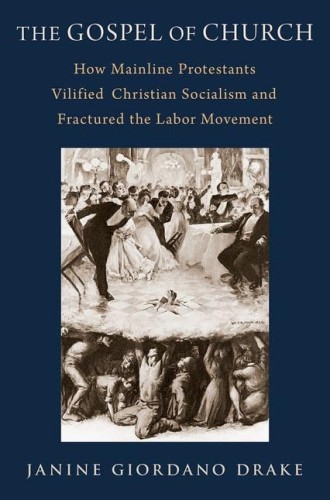Social gospel heroes?
Janine Drake identifies ulterior motives in the church’s collaboration with labor in the early 20th century.
People are often the hero of their own story, but what happens when we try to make ourselves the hero of somebody else’s story? In her account of labor reform and Christian socialism in the early 20th-century United States, Janine Giordano Drake claims that this is precisely what the leaders of the social gospel movement did. While many progressive Christians today celebrate the history of the social gospel movement and its impact on labor reform, The Gospel of Church tells a different story, in which White Protestant ministers co-opted the moral authority of a diverse working class and took credit for the success of the labor movement. In taking over the narrative, these ministers did indeed succeed—not in achieving solidarity with wage workers, but in their goal to grow church numbers and “restore churches and church-based charities to that coveted role in American culture as the primary purveyors of education, health, and social services.”
Drake opens her argument in convincing fashion by immersing readers in the anxiety surrounding the relevancy of the church in the Gilded Age (1877–1900). Drawing on popular fiction of the time, she shows that the average American distrusted Protestant churches, believing they catered solely to the wealthy. While the working class celebrated the figure of Jesus the carpenter, they rejected “churchianity,” a term coined by minister and social gospel leader Charles Sheldon to satirize those who believed in the church more than Jesus. Rampant distrust in the church, combined with low attendance and the rise in popularity of socialism, left ministers scrambling to remain relevant. Drake finds it suspicious that at the height of socialism’s popularity, social gospel ministers formed the Federal Council of Churches, a union of 32 Protestant denominations committed to labor reform in partnership with the American Federation of Labor. Drake provokes readers to ask: Did the leaders of the social gospel movement really care about the daily conditions of workers, or did they primarily care about getting those workers through the doors of their churches?
Drake depicts the FCC’s work in labor reform as ultimately directed toward the goal of making the church relevant. This was evidenced most clearly in the FCC’s involvement with strike reports, in which members of the FCC would investigate labor conflicts, write up their findings, and offer recommendations to ameliorate the situation. The FCC’s recommendations typically emphasized the need for the church’s moral authority and advised companies to hire industrial chaplains to support workers and encourage them to attend a local church. For Drake, these reports indicate a move on the part of the FCC to take moral authority away from unions in order to “install white Protestants as the highest moral authorities.”





